109. A letter to Terry ✒️ #25
On annotating Austen, and how to stay warm this winter.
This is the latest letter in my regular, informal correspondence with Substacker and fellow Brit Terry Freedman, in which we take turns every other Wednesday to delve into the things that British people talk about the most. So that you can explore these unashamed clichés for yourself we’re inviting you to read our letters over our shoulders.
My next ‘Dear Reader, I’m lost’ post will of course be published on Saturday.
Dear Terry,
Thank you for your latest letter. Like you I am happy to be back to our proper sequence of numbering. Counting is clearly a struggle for you, as you had so clearly demonstrated in your first your second one of your early paragraphs:
As I am fond of saying, there are three kinds of people, those who can count and those who can’t, and you are clearly in the latter category.
And in reply to your question, no, I’m afraid the entry I had made in my journal after our meeting had not been exactly what Catherine in Northanger Abbey had been encouraged by Henry Tilney to write in hers. Let me just reproduce here the short passage which you’d quoted in your letter:
[I met] a very agreeable young man… [and] had a great deal of conversation with him – seems a most extraordinary genius…
From Northanger Abbey by Jane Austen, published 1817
Well, I would have trouble describing as ‘very agreeable’ a person who has taken such pleasure in disagreeing with almost everything I have written in our series of correspondence over the last eleven months. To use the word ‘agreeable’ in our circumstances would be bordering on hyperbole.
Terry, would you like to see my actual journal entry relating to our meeting?
Such a wonderful day. T + E absolutely super company 🙂 KT memorial, coffee (Paul’s), Guildhall, Pret, Daunt Books, Pret
And then another entry, just two lines down:
Such a great day 🙂
It’s interesting that you have brought up Austen’s Northanger Abbey – how are you enjoying it? I read Mansfield Park for my English A level, and given your (might I say excellent?) suggestion for us to include – in your words – ‘some lit crit’ in our letters, I have dug out my actual copy of the book from that time (1990 to 1992, since you’re bound to ask).
Terry, forgive me: I cannot possibly review such a volume on the brief pages of this letter, for the very idea of so exhausting a task has given me quite the headach1. Upon my word, sir, I feel a pressing need for my phial of aromatic vinegar.
😉
It’s been a re-education, actually, flicking through the 456 pages of Mansfield Park again. I don’t remember annotating the book at the time, but my scribbled notes absolutely fascinate me now.
On page 52, where newly-uprooted 10-year-old Fanny has recently arrived in the formal setting of her aunt and uncle’s house, Mansfield Park, from the chaotic household in Portsmouth which she had shared with her exhausted parents and numerous siblings, her kindly cousin Edmund is encouraging her to write a letter to her favourite brother, whom she is missing terribly.
‘Would it make you happy to write to William?’
‘Yes, very.’
…
‘…it shall go with the other letters; and, as your uncle will frank it, it will cost William nothing.’
‘My uncle!’ repeated Fanny with a frightened look.
‘Yes, when you have written the letter, I will take it to my father to frank.’
Fanny thought it a bold measure, but offered no farther resistance.
Of course these days – unlike in 1814, when Mansfield Park was first published – the sender of a letter is responsible for paying its postage. The fact that Fanny’s dour uncle Sir Thomas Beecham was a member of parliament had warranted a scribbled note an annotation: his parliamentary status entitled him to send post without any obligation on its recipient to pay.
Mansfield Park is essentially a tale of high jinks and bad behaviour on the part of most of its younger characters, and of shockingly bad examples being set by their elders. Despite it having been a tedious read in places, I remember the book being a rather fun story in which common sense had eventually prevailed with the right people falling in love at the end.
During my reacquaintance with the book I frowned when I got to page 183, not understanding immediately why I had written its number in pencil at the bottom. Turning it, I noticed that page 184 marked the start of chapter 18 – was it the case that the last page of every chapter was missing its page number?
Terry, it was. Yet on no last page of any other chapter had I seen fit to fill in the missing number by hand, so why had I singled out 183 for special attention? 🤔
I can only think that it’s because page 183 is as perfectly filled with text as its neighbour 182, and the only difference between the two pages is the missing number. The pages didn’t match; they looked wrong, and at the time, my very literal this-needs-to-be-symmetrical brain just couldn’t handle it.
(I still can’t handle it. I’d do the same even now; my brain remains that literal.)
I am glad that you’ve brought up Puddlegate again as a subject for discussion. Do you feel that the chilly onset of winter teamed with the accumulation of water near your bus stop might excite the local ice-skating population?
I spotted a terrific video on the BBC News website over the weekend, which shows an ice-rescue instructor2 skating on a ‘once-in-a-decade’ ice window in Alaska. In the video, Luc Mehl describes the lake as always being clear due to its lining for rock rather than soil or vegetation, and that the lake had frozen with such transparent ice because of ‘an usually cold by dry transition into winter.’ Terry, it’s beautiful.
I’d caution your rubber duck to steer well clear of such pursuits, though, lest its undercarriage be frozen to the ice until spring. 🥶
Speaking of freezing, I trust that your furry felines Willow, Minty and Mocha are keeping you warm. In the absence of any pets of our own, and although our hot water and central heating boiler runs on oil, we rely on an electric heater in our conservatory-cum-dining room, and since our traditional electricity meter was replaced with one of those new-fangled ‘smart’ meters last week we’ve had more than a weather eye on our consumption.
I wouldn’t mind, but since the clocks went back at the end of October it’s been getting dark by mid-afternoon, and thanks to Jim’s clever3 positioning of the monitor in what feels like permanent eyeshot I feel it’s judging me whenever I’ve put the lights/dishwasher/oven/kettle on. I’m thinking of turning the stupid thing off at its bally socket in order to preserve a) power and b) my sanity.
#sigh
With Jim’s new reluctance to put any lights on at all I feel as if we’re in a permanent power cut. I shall be asking him for a head torch for Christmas.
The installation of our smart meter and our ensuing disagreements discussions around our electricity consumption reminded me of a fabulous episode of Hancock’s Half Hour, entitled ‘The Economy Drive’.
There’s a link to the recording below, and my transcript of part of it is below that:
In the episode, Tony and his friend Sid have just arrived home from a three-month holiday to find a stack of milk bottles outside the front door and a pile of newspapers beneath the letterbox in the hall. All the lights are blazing, and when Tony goes upstairs to change, Sid tears around the house guiltily switching things off.
‘All right, what was it?’
‘What was what?’
‘What did you just switch off?’
‘Switch off?’
‘Switch off.’
‘Who?’
‘You.’
‘When?’
‘Just now.’
‘Nothing.’
‘Yes you did. I went to have a look at the meter to see how much electricity we’ve burned. That little flat disc inside was hurtling around like a Catherine wheel. Suddenly it slowed down. What was it? Come on, what did you switch off?’
‘Oh all right, the electric fire.’
‘Electric fire. How many bars?’
‘All of them.’
‘All of them? Three bars, and a penny a bar an hour for three months. What my electricity bill is going to be for this quarter I hesitate to think. Do you realise you didn’t turn one single thing off? Not one single thing. The washing machine was still going. All the water has evaporated, and what has happened to the shirts we shall never know. All that I could hear were six buttons and a collar stud clanking about.’
DIY transcript of a section of audio from ‘The Economy Drive’ written by Ray Galton and Alan Simpson, broadcast 1959.
Well, that’s one thing we haven’t got to think about at Holden Heights: our washing machine has been on the blink for a fortnight, and it’s due to be repaired at last tomorrow. I might put the kettle on to make the engineer a cup of tea, but only if I haven’t got any lights on at the same time. 🙄
Onwards and upwards, Terry! Do write back soon.
All the very best,
Rebecca
If you’ve enjoyed reading this letter to Terry, please let me know by clicking the heart. Thank you! My next ‘Dear Reader, I’m lost’ post will be published on Saturday.
You’ll find the rest of my letters in this series by clicking the ‘Letters to Terry’ tab on the top bar of my home page. Terry and I take it in turns to write to each other on alternate Wednesdays, and I really enjoy our light-hearted correspondence! You can access both Terry’s letters and mine using the index below:
Check out Terry's fabulous newsletter, and to make sure you don’t miss his reply to this letter next week, why not subscribe? You’ll be glad you did!
Last but not least, do please share and subscribe for free! Thank you!
Good, because safety first!
Not clever.

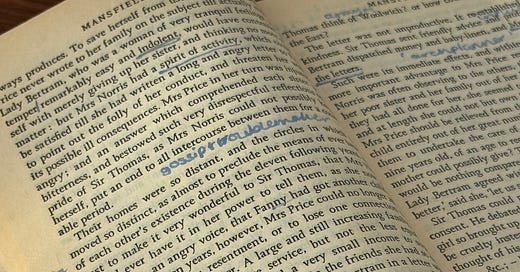



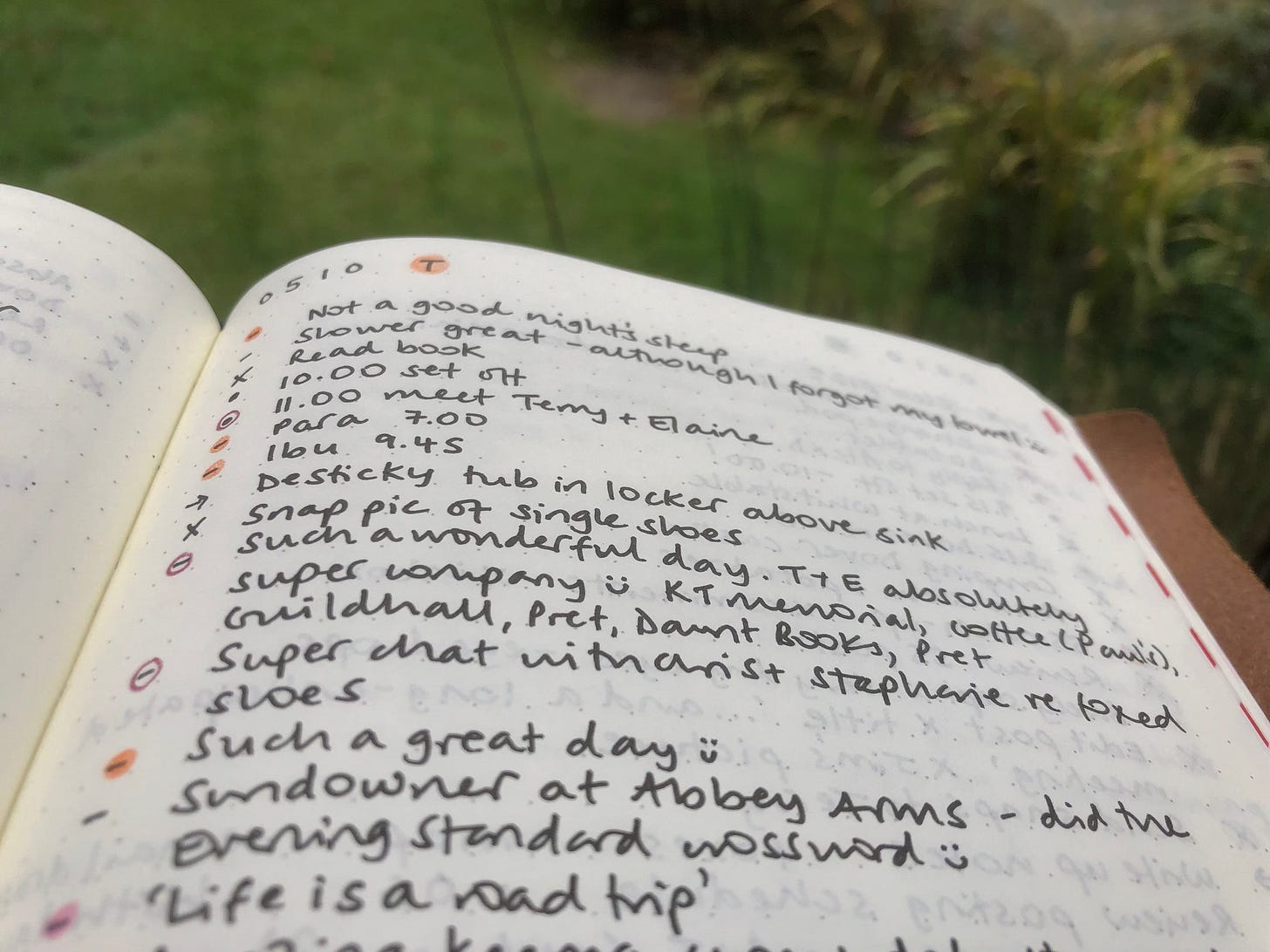
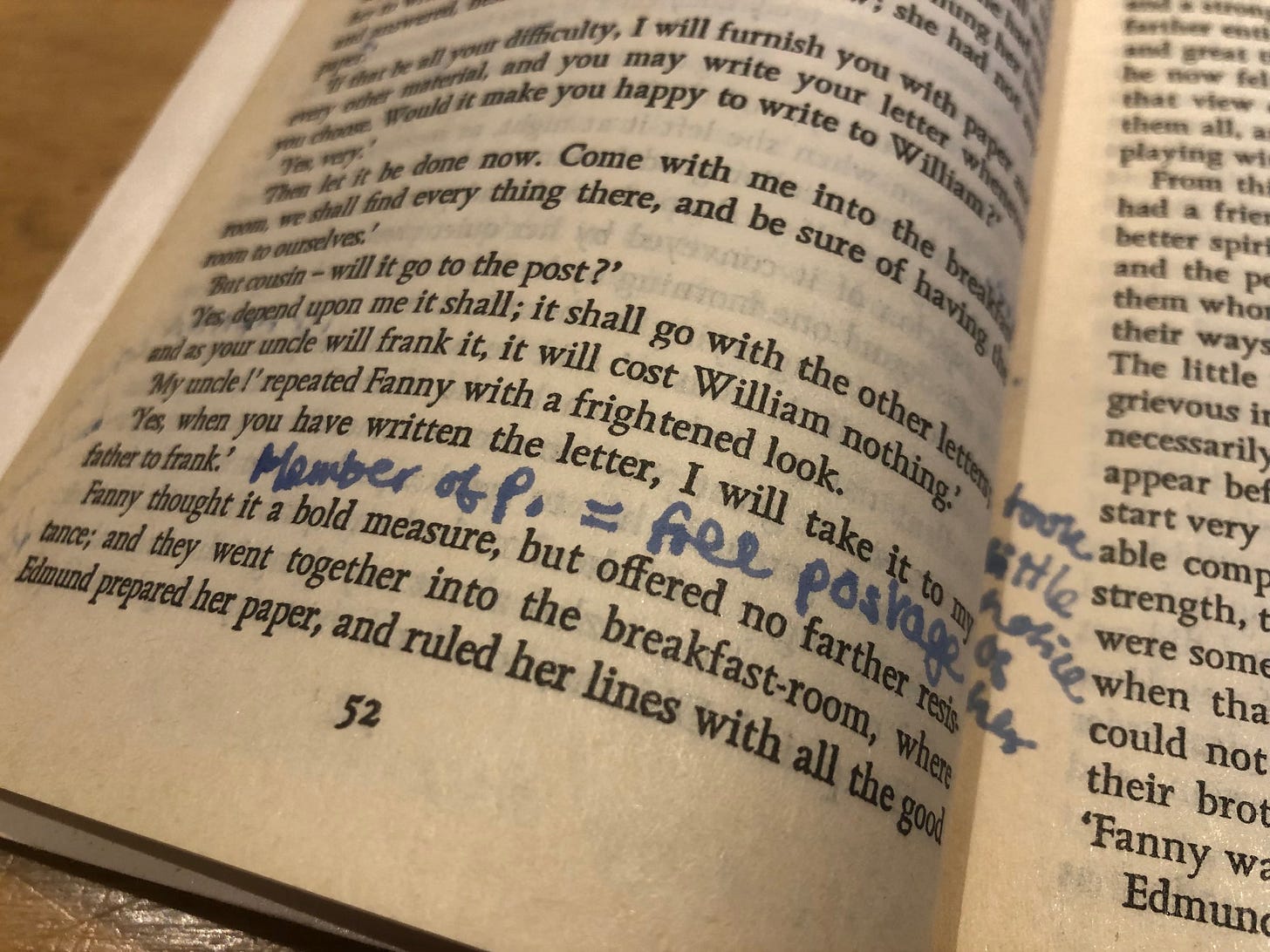
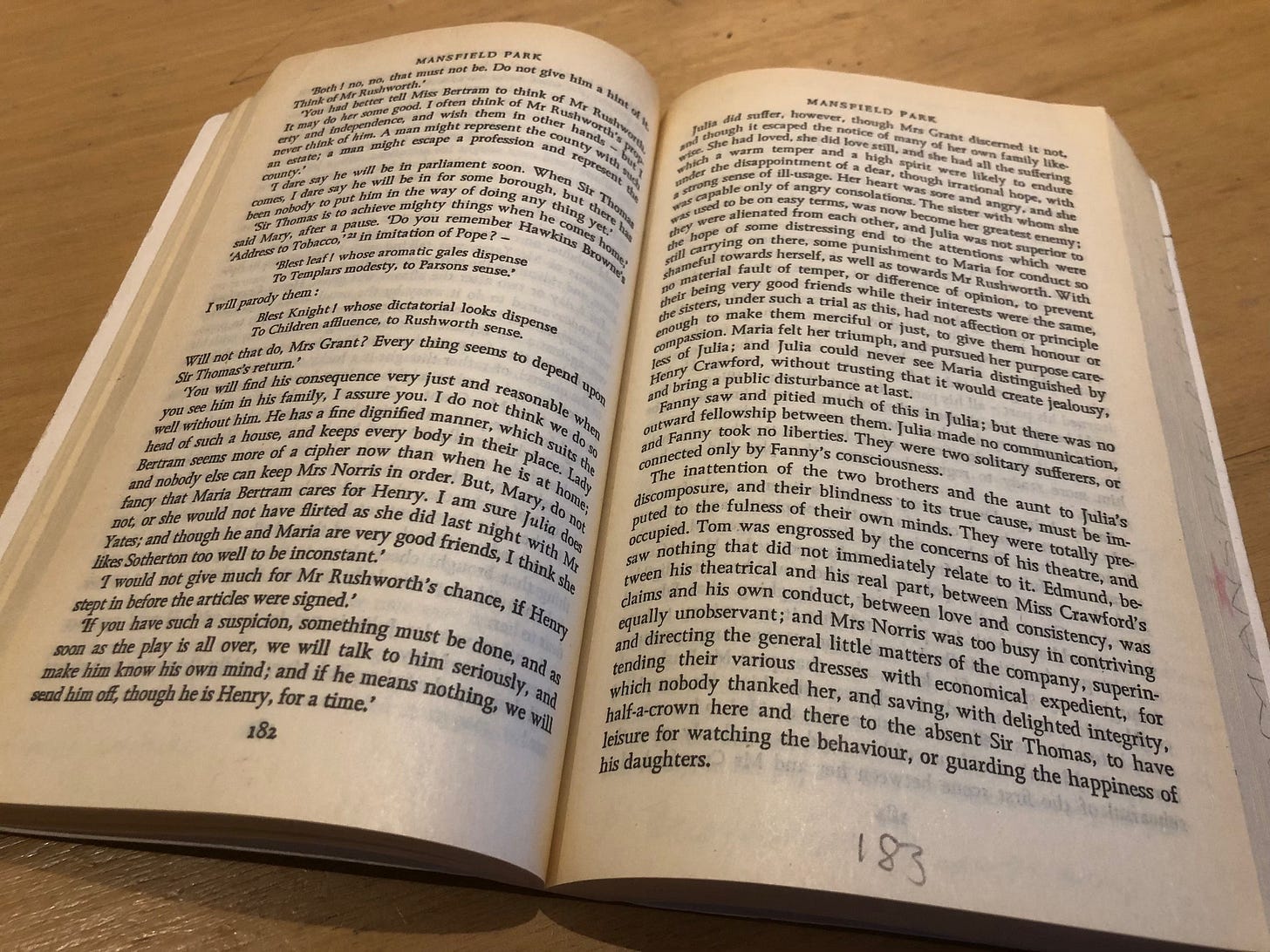
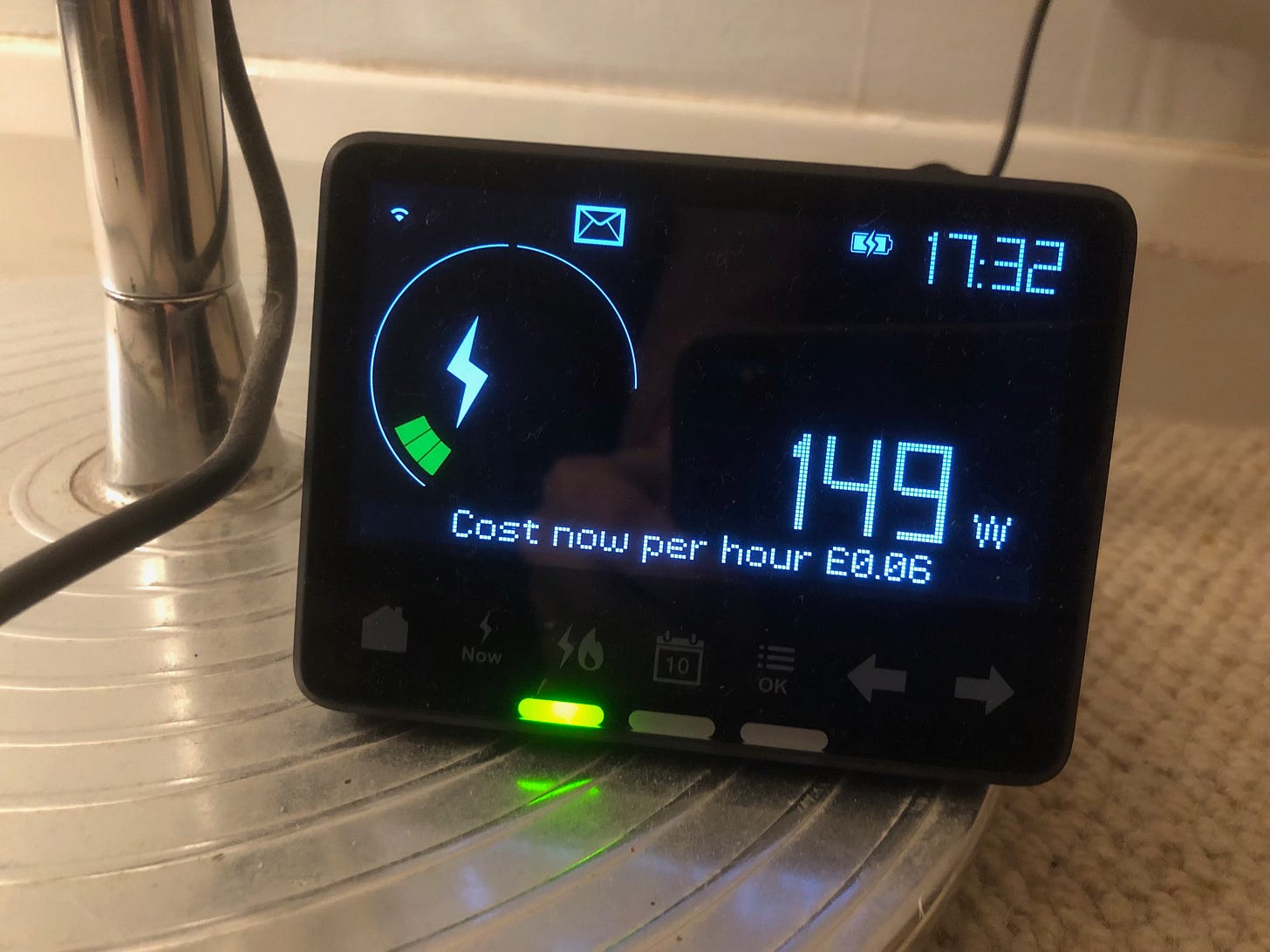


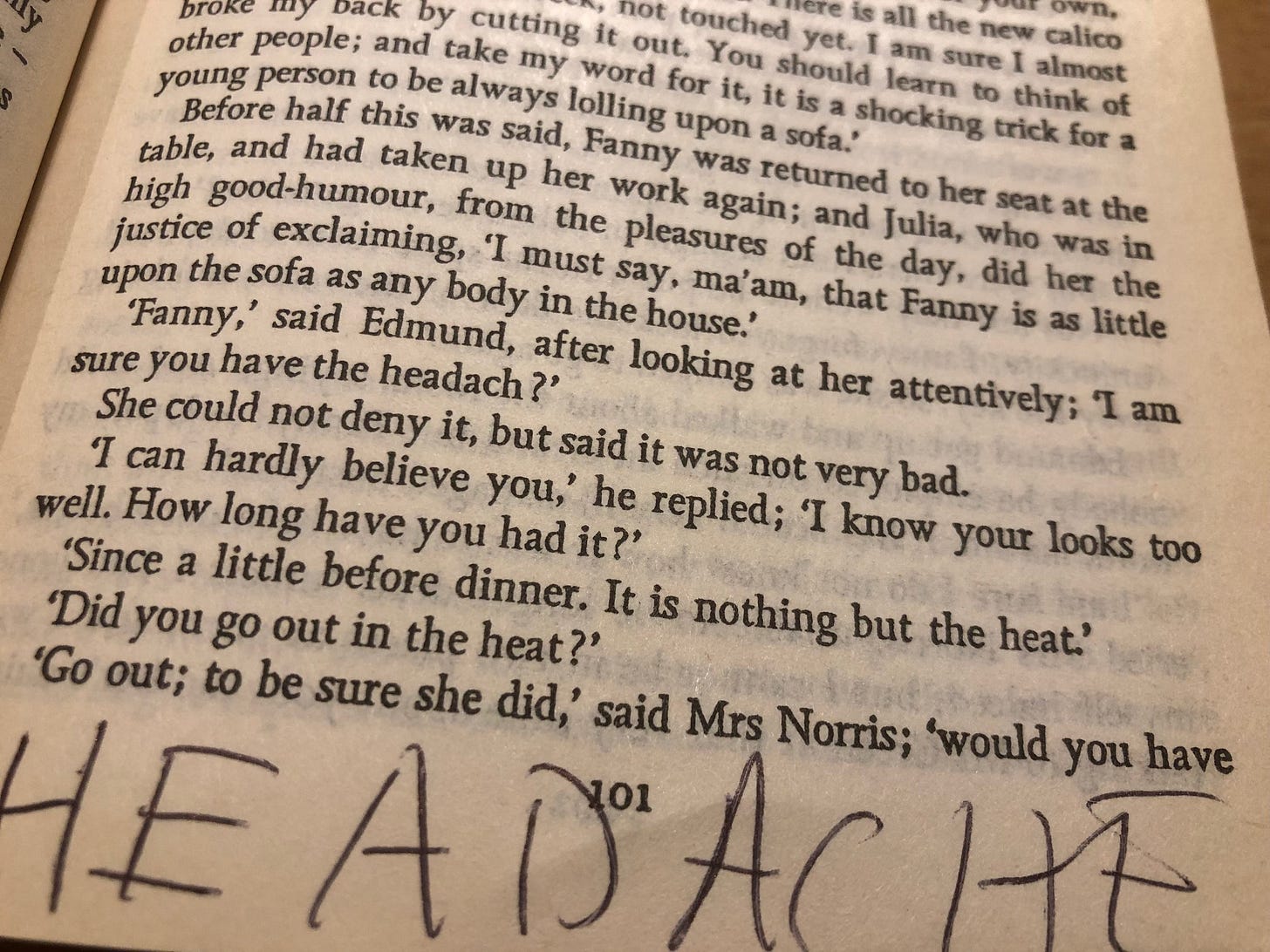
"forgive me: I cannot possibly review such a volume on the brief pages of this letter, for the very idea of so exhausting a task has given me quite the headach¹. Upon my word, sir, I feel a pressing need for my phial of aromatic vinegar." Superb!! And, PLEASE, toss out that smart meter! I mean, really, Rebecca, is life so full of comfort we can now deny ourselves light and warmth!. All these diabolical little devices incessantly nag at us -- it can't be good for the soul.
Always enjoy your banter with Terry!
Speaking of “Smart Meters”... (this is a trigger for us! LOL!)
Quite a few years ago now when they first came out here in my home state of Maine, I’d heard some horror stories about them, everything from their causing some real sensitive people to get headaches from them to catching homes on fire. Yikes! Plus we were perfectly happy with our old analogue meter. Add to that, because of the smart meters, they would be cutting out many jobs for those who came out monthly to “read the meters”. My husband who is a mathemagician when it comes to numbers was always able to read our meter after the reader came out. He’d do a double check. Those who opted for the smart meters, or didn’t know they had a choice, later were getting screwed royally on their electric bills. So much so that we have a face book page all about how many people our local CMP (Central Maine Power) has not responded to many of their customers complaints about the new meters jacking up their bills. It all came to a head a couple years ago when the Public Utilities Commission was forced to investigate. But it was like the wolf checking in on the sheep. Nothing much came of it. As it stands our Electric company has most of their shareholders in Spain. We have a hard time trying to figure that one out! But I digress... long story short, even though our Electric bill is high, at least we still have our old analogue meter. The reader comes and reads it every month. With the implementation of smart readers, they were coming only every 3 months to read our analogue. When the bills were not adding up right, we complained and they now come every month like they used to.
The interim election last week, we tried to vote CMP out, in favor of “Pine Tree Power” where the people of Maine would eventually own the power company like a co-op. Sadly it got voted down. The big conglomerates in Spain had way more money to throw into the ring than PTP. Also, the Unions voted against it. And so progress and improvements as always move at a glacials pace.
Look forward to your next posts. ❤️